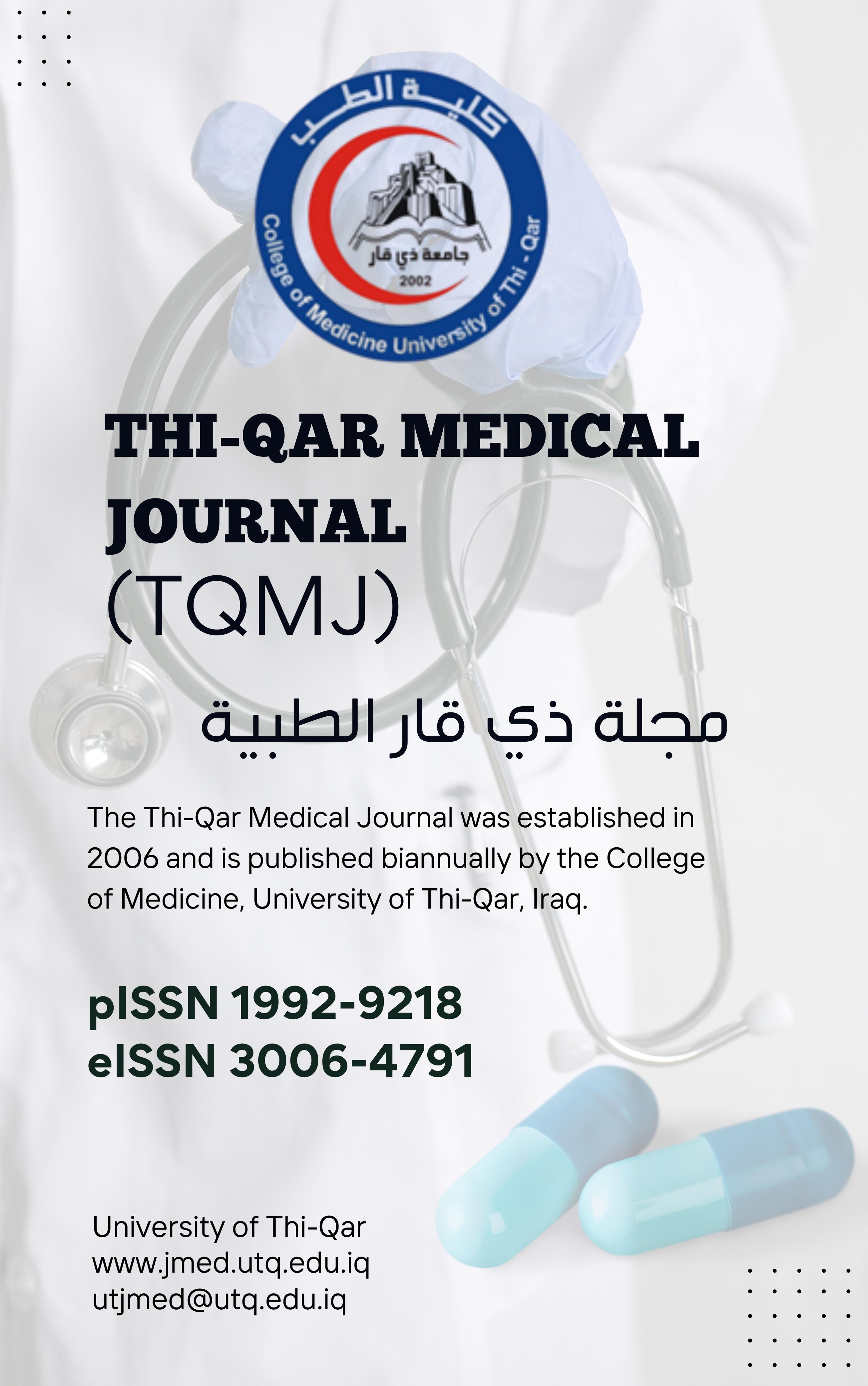EFFECT OF GOOD GLYCEMIC CONTROL ON LIPID PROFILE IN TYPE 2 DIABETES MELLITUS PATIENTS IN AL HUSSEIN TEACHING HOSPITAL
DOI:
https://doi.org/10.32792/tmj.v5i2.250Abstract
Background: diabetes markedly increases the incidence of macrovascular complications. For example, the observed 2- to 3-fold greater risk of myocardial infarction with diabetes rises to 8-fold in the presence of hypertension and to nearly 20-fold if both hypertension and dyslipidemia are present; smoking increases these risks even further. As a result, the diagnosis of diabetes mellitus should quickly prompt both an exhaustive search for coexisting cardiovascular risk factors and the initiation of aggressive preventive measures. Objective: The present study was conducted to evaluate the initial benefit of good glycemic control in patients with type 2 Diabetes Mellitus related dyslipidemia . Patients and methods: Fasting blood sugar, random blood sugar and lipid profile among 150 patients with type 2 Diabetes Mellitus who were regularly attending diabetes and internal medicine clinic in An Nasiriyah General hospital were measured and observed for the period of the study . Results: We found that the level of serum cholesterol especially LDL was significantly low in those with good glycemic control in comparison with those with poorly controlled DM . This reduction in serum cholesterol and LDL would be expected to reduce the risk of atherosclerosis and ischemic heart diseases.References
Eckel RH, Wassef M, Chait A, et al. Prevention conference VI: diabetes and cardiovascular disease: writing group II: pathogenesis of atherosclerosis in diabetes. Circulation 2002;105(18).
Gaede P et al. Multifactorial intervention and cardiovascular disease in patients with type 2 diabetes. N Engl JMed. 2003 Jan 30;348(5):383–93.
Collins R, Armitage J, Parish SHeart Protection Study Collaborative Group, et al: MRC/BHF Heart Protection Study of cholesterol lowering with simvastatin in 5963 people with diabetes: A randomised placebo controlled trial. Lancet 2003; 361:2005-2016.
. Colhoun HM, Betteridge DJ, Durrington PN, et al: Primary prevention of cardiovascular disease with atorvastatin in type 2 diabetes in the Collaborative Atorvastatin Diabetes Study (CARDS): Multicentre randomised placebo-controlled trial. Lancet 2004; 364:685.
Dormandy JA, Charbonnel B, Eckland DJfor the PROactive investigators, et al: Secondary prevention of macrovascular events in patients with type 2 diabetes in the PROactive study (PROspective pioglitAzone Clinical Trial In macroVascular Events): A randomised controlled trial. Lancet 2005; 366:1279.
UK Prospective Diabetes Study (UKPDS) Group: Intensive blood-glucose control with sulphonylureas or insulin compared with conventional treatment and risk of complications in patients with type 2 diabetes (UKPDS 33). Lancet 1998; 352:837-853
Lehto S.Ronneman T,Haffiner SM,Pyorala K,Kallio V,Laakso M. Dyslipidaemia and hyperglycemia predict coronary heart disease events in middle age patients with NIDDM. Diabetes 1997,46:1254 – 1359.
Hokanson JE, Austin MA, plasma triglyceride as a risk factor for cardiovascular disease independent of high densitylipoprotien cholesterol a meta – analysis o9f population – based prospective studies. J. Cardiovascular risk 1996,3:213 – 219.
Pyorala K, Pedersen TR, Kjekshus J, Faegeman O, Olsson AG.The Scandinavion Simvastatin Survival Study (4S) cholesterol lowering with simvastatin improve prognosis of diabetic patient with coronary heart disease: a sub-group analysis of the Scandinavion Simvastatin Survival Study (4S), Diabetes care,1997,20:614 – 620
Goldberg RB,Mellies MJ, Sacks FM, Moye LA, Howard BV, Howard WJ, et al Cardiovascular events and their reduction with pravastatin in diabetic and glucose intolerant myocardial infarction survivors with average cholesterol levels,Circulation,1998,98:2513 – 9
Koskinen P, Manttari M,Mannin V,Huttunen JK, Heinonen OP, Frick MH, coronary heart disease incidence in NIDDM patients in Helsinki Heart Study. Diabetes care, 1992;15:820 – 5
Elkeles RS,Diamond GR, Poulter C, Dhanjel S, Nicolaides AN , Mahmood S, et al. The SENDCAP study group. Cardiovascular outcomes in type 2 diabetes. A double – blind placebo – controlled study of bezafibrate, Diabetes care, 1998;21:641- 8
Naheed T, Khan A, Masood G, Dyslipidaemia in type 2 diabetes mellitus patients in a teaching hospital of Lahore, Pakistan, Pak. J. Med.Sci, 2003;19 (4) 283 – 286.
Khan JA, Khan SP, Ahmed Z, Shah SH, Khaliq MA, level of hyper-cholestrolemia in patients admitted for heart diseases; a pilot study, Pak. J. Med Res 2001;40(1): 18- 19.
American Diabetes Association Management of dyslipidaemia in adult with diabetes. Diabetes care1999;22(suppl 1):556-9.
Watts GF, coronary disease, Dyslipidaemia and clinical trials in type 2 diabetes mellitus; Review article Prac Diab Intern,2000;17(2):54-59.
Marcus AO, Lipid disorders in patients with type 2 diabetes; Meeting the challenges of early, aggressive treatment, Postgrad Med,2001;110(1):111-23.




